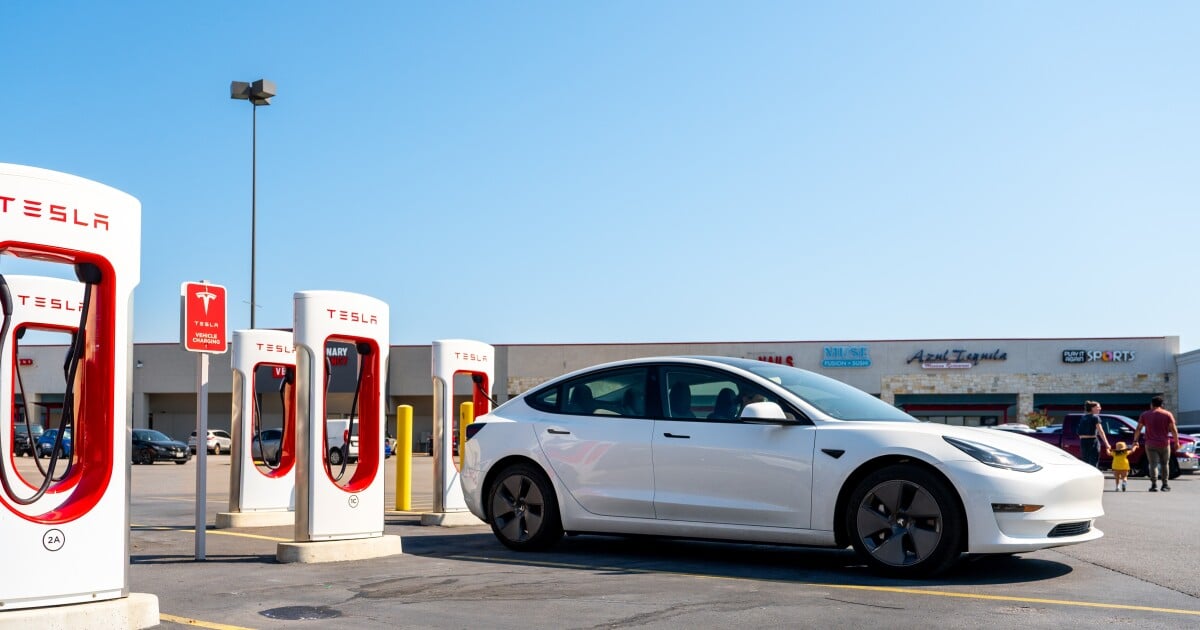Everyone knows that electric vehicles are supposed to be better for the planet than gas cars. That’s the driving reason behind a global effort to transition toward batteries.
But what about the harms caused by mining for battery minerals? And coal-fired power plants for the electricity to charge the cars? And battery waste? Is it really true that EVs are better?
The answer is yes. But Americans are growing less convinced.
The net benefits of EVs have been frequently fact-checked, including by NPR. "No technology is perfect, but the electric vehicles are going to offer a significant benefit as compared to the internal combustion engine vehicles," Jessika Trancik, a professor at the Massachusetts Institute of Technology, told NPR this spring.
It’s important to ask these questions about EVs’ hidden costs, Trancik says. But they have been answered “exhaustively” — her word — and a widerange of organizations have confirmed that EVs still beat gas.
deleted by creator
And when we actually get that going I’ll stop making sure I always have a car available.
For inner city folk yes.
deleted by creator
I used to live outside a town of 3,000 people. Prior to the 1950s it had a trolley that would take you to the 15 miles to the nearest city, and from there you could catch a train to go pretty much anywhere.
Saw a rural bus system working perfectly fine in South America. If they can figure it out, so can we.
In Japan, taxes collected on the Tokyo metro (which is privately owned but heavily regulated) help subsidize a thousand little suburban and rural bus and rail lines. It’s not rocket science, even in the US a similar scheme is employed by the Post Office to ensure everyone’s mail costs the same to the consumer.
Even just taxes. I pay taxes. I’d like to breathe less shit from all the commuters and have all the people I depend on at their work. This aversion to taxes in the US is terminal unless we get rid of it.
deleted by creator
By insisting on perfect, you are preventing incremental change.
You can buy an EV and have a country invest in transit. These do not need to be exclusive things
Sure. Or I can drive my old car very little and be pissed my country subsidizes a clearly inferior solution just to save the car industry instead of subsidizing way more efficient and environmentally friendly mass transit.
Edit- I think we’re agreeing now that I look at your other comments but I’ll leave this.
Incremental change would have been fine in the 1970s when the world should have instituted it, including incrementally reducing industry to absolute necessities like medical products, and individual developed world quality of life, to find homesotasis with our only habitat.
Now it’s smash the factories today, and accept the hundreds of millions dead breaking those poisonous supply chains, including possibly ourselves, for humanity to have any non-nightmarish future on a planet we terraformed to be hostile towards Human life for the next couple million yers.
But having absolutely failed to institute incremental change half a century ago despite warning, and absolutely failing to take drastic action now that we are just beginning to feel our irreversible fine work, our species clearly and resolutely chooses no future/nightmare susbsistance future, or at the very least there wouldn’t be a pop figure/pointless plastic crap factory left standing in the world. 🔥🤷♂️🔥
What I find the most ridiculous is what we’re doing: resolutely choosing death by actions, while still strangely preaching hope for a future. WuT a weird fucking species we were.
it’s not just capitalism, the US is a very spread out place compared to most other countries. if you want everyone to use mass transit you’re asking them to either 1) move into the city for similar commute times, or 2) spend an inordinate amount of time riding busses around the suburbs for the same distance commute. Neither are good solutions.
And also we have solved the “getting to work” debate with teleconferencing. why should we need cars or an even bigger mass transit system when most people can simply work from home?
Eh there are plenty of places that have less population density than the US but they do just fine with transit. It might be true that most US cities are poorly designed for transit, but the density isn’t a the reason.
can you really blame us?
let me run through the last 8 years of American history with four words, “we were lied to”. doesn’t matter from whom, doesn’t matter what. we’re constantly being lied to. truth is, it’s been true for longer than 8 years, but the last 8 have been especially transparent.
we’re learning that the upper echelon only trusts the American public to do three things; consume, produce, and die. if you can’t even do that for them, you’re removed as an undesirable.
so yeah, trust in the system is broken. it’s going to take at least a generation or two just to repair it ** if they work on it**.
I can’t fault anyone who’s untrusting of a system that continuously covers lie after lie with more lies.
8 Years?
How long did fossil fuel companies know about climate change?
How long did the fuel industry know about the effects of leaded petrol?
How long did cigarette companies know about links to cancer?
How long did pharma companies know about opioid addiction risk?
How long did social networking companies know about psychological manipulation?
How long did the sugar lobby know about their links to diabetes and obesity?
How long did the manufacturing companies know about PFAS and microplastics?I would say you have always been lied to.
Your forgot that plastic manufacturing knew it wasn’t recycled or recyclable.
I can’t fault anyone who’s untrusting of a system that continuously covers lie after lie with more lies
I can and will. Learn some basic critical thinking skills and apply them. Throwing your hands up and ranting about how “the system is broken” is mopey teenager shit.
Things are far more complicated than your whiny rant. They world is shades of gray rather than the simplistic “bad guy in black / good guy in white” situation that you characterize it as.
You overestimate the general populations intelligence.
Very true.
Lololol, what a fucking worthless right wing rant
lulz jokes on you.
Fuck Trump, fuck republicans.
The only valid criticisms of EV’s are:
-
They’re harder to extinguish than a gas car if they end up catching on fire.
-
They don’t really solve any of the major issues with car based infrastructure.
-
Tesla is a shit show because of that damn muskrat which pushes a lot of people away from EV’s in general.
They don’t steal a lot of data too? Or this privacy nightmare affected gas car too?
It’s an issue in newer cars in general.
-
Over the longterm, and they also require a lot less maintenance because they don’t have to deal with mini-explosions from combustion generating excess heat and stress. The problem is in the battery, and the industry hasn’t even scratched the surface for solutions.
I see trucks carrying butane tanks all the time, where are the trucks carrying EV battery replacements? There aren’t because the industry wants to charge extra for fixed installation ones depending on capacity and charging capacity and there is absolutely no profit incentive that offsets other losses to standardize battery systems in a way they can be easily extensible or replaceable.
I see trucks carrying butane tanks all the time
That’s not the equivalent to battery replacements but to the power grid, which of course is yet another win for EV (since clearly distributing the energy source for vehicles over the power grid is safer and more environmentally friendly than needing huge trucks to carry it).
(I’d say battery replacements are closest to motor replacements in gas cars in terms of costs and effort. What about the environmental impact? -> That’s why it’s so costly. To mitigate environmental impact.)
Battery replacements really are not difficult, I’d seriously recommend not imagining obstacles where there are not.
Without special installations, charging takes several hours instead of a quicker battery swap (which you could take with you as extra weight). DC chargers cannot even be installed at how home due to their requirement. Swappable batteries are possible and would make EV cars adaptable to new and different battery technology, they are just not designed that way.
Some, like the XBus, talked about allowing it, and it is perfectly possible, it just isn’t going to come out of traditional car manufacturers who had to be dragged to develop anything EV or manufacturers like Tesla who want to make range a subscription feature. Let’s not even go into EV range extension trailer systems, which would be as effortless as swapping trailers.
So, just so you know, the average EV battery weighs 1000lbs, and some all the way up to 2000lbs in something like the EV hummer. (Unnecessary I know). The cost to have a battery in an EV replaced currently sits around $5000 to $15000 off of warranty. So there are definitely obstacles. Along with letting the general public fry themselves trying to hook up a 400v battery. You’re not dealing with AA batteries. Battery technology is far away from something able to swap out yourself with the ease you may be thinking of.
So, just so you know, you can purchase 96V batteries that weigh less than 30 kg and can be connected in series to provide well over 400V, and if you want more range you can install bigger ones. EV ones weight that much because of the range, which is less of a factor if they can be swapped. They are made up of cells which are individually far below 400v, and there are standardized Anderson connectors that can safely connect and disconnect +600V and are used all the time. The cost of a battery is a non-factor is you are just renting them like you are sort of expected to do with butane tanks. 50V is the limit where you usually begin receiving a shock at, but 400V is not really considered high voltage and can be easily handled with the proper connectors and failsafes, like not swapping with a load.
It’s better than letting the general public fry themselves trying to fuel their cars with an ignitable combustible.You are not dealing with rubbing alcohol. /wildscaremongering
Battery technology is something I’m constantly swapping out for myself with ease, but that’s because I don’t make my own mental blocks. So do owners who retrofit gas cars to EVs. My goal is to retrofit an older EV car so that I don’t have to pay around $5000 to $15000 of overpriced proprietary batteries. It is a long-term goal, but be happy, it is not one that could be shared because the only way to do so would be in a society open to it.
Please let me know how that goes for you and when I can purchase one that allows me to travel 500 kilometres in -25°C without disabling the vehicle mid trip in that mentioned temperature.
You mean for your highly specialized need that the majority of potential EV drivers currently turned off by the step costs don’t need? Sure, let me just make a note, since the solution is scalable, even working in the energy demand of a heater.
Ah yes, I am the only person on the planet who has a need to travel occasionally to a larger city during a normal winter. Got it!
Where are the trucks carrying the replacement petrol tanks for ICE cars?
You can get them at Amazon: https://www.amazon.com/s?k=gas+tank
You aren’t making a point if you are trying to equate the distribution network for gas, which is so ubiquitous that there is no need for the sort of trucks that distribute butane tanks to EV batteries, which require specialized facilities for fast charging, which also deteriorates batteries faster, or otherwise take half a day of charging. EV battery swapping bans already exist for things like scooter rentals.
There are already standarized sizes, voltages, and ports using in autocaravans which could be connected in series ideally through BMS to provide the voltages EV cars would need and would even be simpler through already prepped trailer systems. Four 96V batteries (can go up to six) in series connected safely through Andersen connectors would be enough for a basic EV car, that’s less than 30kg LiFePO4 each, making it swappable on the spot, less dangerous than lithium, and open to a large market of providers.
An even larger portion of America can’t afford them, so it doesn’t even matter.
deleted by creator
Check out auctions, feds and locals are always dumping cars. They can be a decent bit cheaper than dealerships with better maintenance and lower prices, talking SUV with sub 20,000 miles on it for $2,000 cheap.
Removed by mod
Put them in a sealed room with a gas engine running and you’ll see how fast they realize that they’re cleaner
Fair, but the first rebuttal is going to be “go into a sealed room with a coal fire burning”
… how is that an argument?
The argument is that all you’re doing is moving the carbon emissions from the car directly in your vicinity to the coal-fired power plant a long distance away. Move that same coal-fired power plant into the sealed room, and suddenly it’s no longer far away, and the “unclean” nature of the electric car, so the thought process goes, becomes obvious.
That’s the thought process if you just stop thinking when you get to a point that reaffirms one’s biases. If you continue down that train of thought you’d realize it’s a lot easier to regulate and monitor the emissions of a coal power plant than it is every single car on the road. Plus you don’t need to use coal to make electricity.
Isn’t the whole point that the gas engine equivalent is just in somebody else’s room though?
In any case, I’ll take whatever partial climate wins we can get.
Solar, wind, and nuclear energy: are we a joke to you?
deleted by creator
Because we Americans are easily swayed by propaganda, unfortunately.
Its about 40% more power efficient per mile but theres a couple of other trade-offs, still better yeah.
Not surprising. There has been a pretty successful campaign by the right to paint EVs as worse for the environment because we get our electricity from coal (we barely get anything from coal) and mining; more expensive to fuel up (using the highest priced fast charging vs lowest price of gas); and worse from a humanitarian perspective (cobalt mining).
Things to refute this: EVs, even with coal power as their energy source, emit less CO2 over the lifespan of the vehicle compared with gas vehicles. Mining sucks and is indeed environmentally damaging but oil is also fucking terrible. The benefit of EVs is that the vast majority of a battery can be recycled whereas oil is single use. So to meet a consistent demand, we do have to ramp up mining but once the demands is met, mining can be scaled back dramatically.
For fuel costs, it’s easy to do the basic math but many don’t. I’ve seen people complain that their electricity bill will just skyrocket. When I suggested my parents get a battery powered riding mower, my mom thought they would be more expensive and that the electricity bill would be just as much as the gas bill. The price of the mower is the same and the electricity cost was about 1/15th of what has is and you don’t have to be riding around in gas fumes.
As for the humanitarian angle, the right obviously does not really give a shit. You could easily point out the atrocities that oil companies have done over the years. You could also point out that cobalt is being phased out. We could also do the mining here instead of having our done abroad. And there is the previous point that most of this just had to be done once then mining can be scaled back.
Because the conservative machine, despite the love of Elon’s right-wing antics, never stop talking about how bad EVs are. Funny, the only time they act like they care about the environment is when they talk about how bad the EV batteries are to manufacture. While they roll coal and drive gas-guzzling mall cruiser bro-dozers all over the place.
Give him a few years into a potential Trump victory, and he will make Tesla to manufacture petrol cars.
zombie engineer voice “traiiiiiins”
Cleaner than gas cars =/= Clean.
This is the lowest possible bar to pass. The point isn’t that EVs are worse than gas. The point is that both are terrible for people, health, safety, climate, transit, sustainability, equity, freedom, etc.
Wut. Cars have legitimate uses.
EVs dont only not pollute wherever they drive, but overall are probably around 70% efficient if including the power generation, while gas is 40% or less.
The others, I think you are projecting US problems to the whole self-owned transportation sector.
“hurr de durr, it’s not fully clean, derp”
Ok Trumper
deleted by creator














